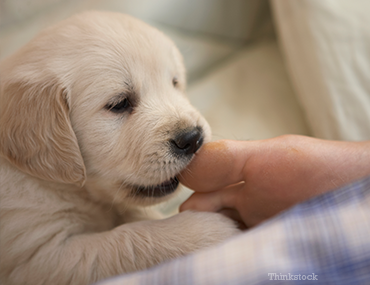Puppies, like human babies, have sharp little teeth. If you’re unlucky enough to be your puppy’s teething toy, those teeth might remind you of Jaws! When your puppy’s biting becomes focused on the human version of the teething ring, it’s time to “nip” her behavior in the bud by teaching him or her the right way to use her new chompers. Understanding why your puppy is biting is the first step toward correcting a behavior that could not only become persistent but could be a potential hazard to others, as well.
“Play-biting” is when your puppy uses her mouth to initiate and sustain play. She may grab onto clothing, or your body, to try and interest you in a game of chase or tag, and then continue by chasing you and tagging you with a little bite! When it’s clear that your puppy is biting playfully, it’s important to redirect her away from this unfavorable behavior toward an acceptable way to play.
Things to do to redirect her attention include:

- Offer a favorite toy to chew on or play fetch with
- Give a quick, high-pitched yelp (not a negative shout of “no” or “stop”) to startle her and stop the behavior. Then praise her for stopping and redirect her to a toy.
- Allow your puppy to socialize with other dogs AND humans so she can begin to understand how to interact properly. Puppies need role models, too!
- “Fear-biting” is when your puppy becomes scared and feels the need to protect herself. You’ll know when she is frightened by her appearance: ears back, tail down or between the legs, and body tense. It is important that you reassure her, through words and tone, that she is okay.
- Let your puppy come to you as you speak to her in a high, happy voice and assume a nonthreatening position by sitting or kneeling.
- Scolding or slapping your puppy for nipping will not improve the situation, and may encourage further aggression.
- Inform other people interacting with your puppy that you are working toward correcting this behavior and ask that they not allow biting on fingers, hands or toes—even if they think it is playful or that she is giving “love bites.”
- Don’t leave your puppy unsupervised during this biting stage.
If you feel like you need additional guidance in correcting this behavior, reach out to your veterinarian for help with behavior modification. They may have tips for you or might be able to refer you to a behaviorist with more extensive training.
If you have any questions or concerns, you should always visit or call your veterinarian – they are your best resource to ensure the health and well-being of your pets.
